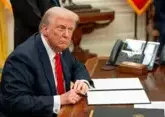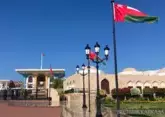US President Donald Trump’s announcement of his readiness to hold negotiations with Iran has sparked a raging debate in Tehran among various officials. Some have expressed caution and their doubt over his intentions, while President Hassan Rouhani has so far remained silent and thrown the ball in Europe’s court to take transparent measures to compensate for the US pullout from the 2015 nuclear deal. As Asharq Al-Awsat writes in the article Trump’s proposal for direct dialogue confuses Iran, he said that Tehran does not want to stoke tensions in the region or international straits, however, it will not easily abandon its right to export oil.
"Today we are at a very critical point in history regarding the nuclear deal, and Europe's transparent measures to compensate for the United States' unlawful withdrawal from it are very important for the Iranian nation," Rouhani said after talks with new British Ambassador Rob Macaire.
This is the second time that Trump expresses a readiness to negotiate with Tehran in wake of last week’s war of words with Rouhani. The first time he made the proposal, it had fallen on deaf ears.
Trump made his proposal on Monday, a week before the first phase of US sanctions are due to be re-imposed on Iran.
Prominent member of the Expediency Council Ali Akbar Nategh-Nouri stated on Tuesday that Tehran must accept Trump’s offer without preconditions. “We cannot stand idly by and refuse talks. We have to contemplate,” the gesture, he said, while also warning that "we should not rejoice over this offer and not get excited." "Trump may take advantage of this over-excitement," he said, the state-run IRNA news agency reported. "It could be a test for us."
He hinted that Omani Foreign Minister Yusuf bin Alawi’s upcoming visit to the US, days after his meeting with Iranian FM Mohammed Javad Zarif, is aimed at mediating between Tehran and Washington.
Iranian Foreign Ministry spokesman Bahram Qassemi later denied Nategh-Nouri’s hints over the Omani official’s visit.
Rouhani’s political aide, meanwhile, Hamid Aboutalebi tweeted: “Those who believe in dialogue as a way to end disputes must commit to it. Respecting the Iranian people, easing the calming the hostile behavior and the United States’ return to the nuclear deal will lead the way on the unpaved road.”
Heshmatollah Falahatpisheh, who heads the parliamentary committee on national security and foreign policy, said that Iranian-American negotiations should not turn into a “taboo” issue.
“The Iranian-American disputes are being run by other players,” he remarked, while demanding efforts to be exerted to set up a “hotline between the two sides to protect Iranian and American national interests against those seeking to take advantage of the escalation” between the two sides.
Iranian Interior Minister Abdolreza Rahmani Fazli stated: “The US is not trustworthy. How can we trust this country after it unilaterally withdrew from the nuclear deal?”
The head of Iran’s Strategic Council on Foreign Relations said Tehran saw no value in Trump’s offer. “Based on our bad experiences in negotiations with America and based on US officials’ violation of their commitments, it is natural that we see no value in his proposal,” Kamal Kharrazi was quoted as saying by the semi-official Fars news agency.
Ali Motahari, the deputy speaker of parliament said that to negotiate with Trump now “would be a humiliation”.
“If Trump had not withdrawn from the nuclear deal and not imposed sanctions on Iran, there would be no problem with negotiations with America,” he told state news agency IRNA.
Trump’s proposal for direct dialogue confuses Iran

9500 views
Поделиться:
- ВКонтакте
- РћРТвЂВВВВВВВВнокласснРСвЂВВВВВВВВРєРСвЂВВВВВВВВ
- Telegram
- Viber
- Skype









